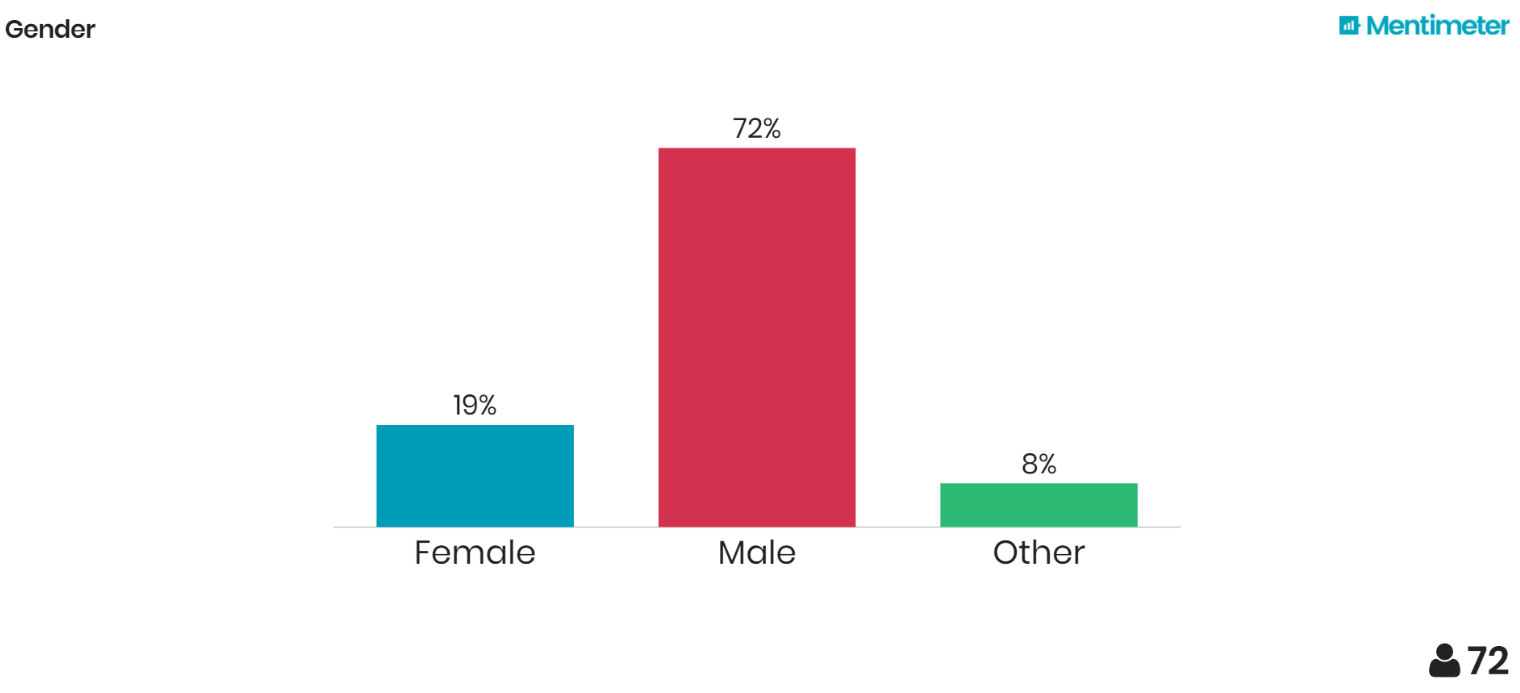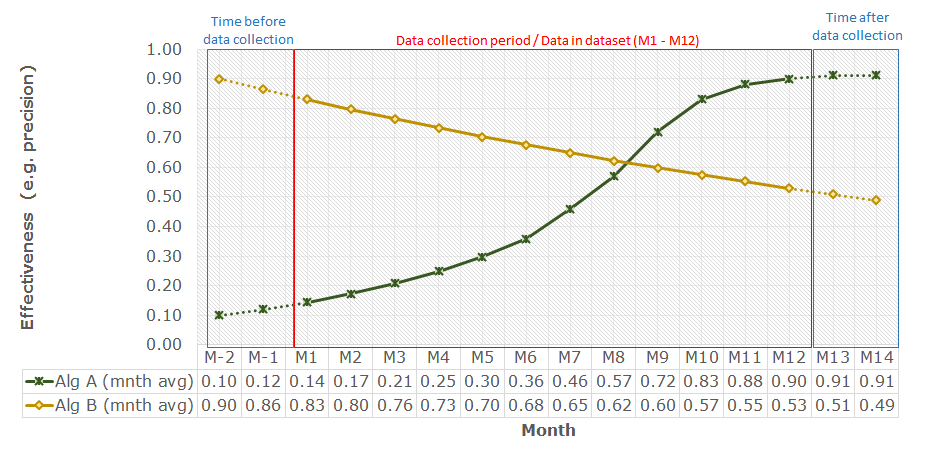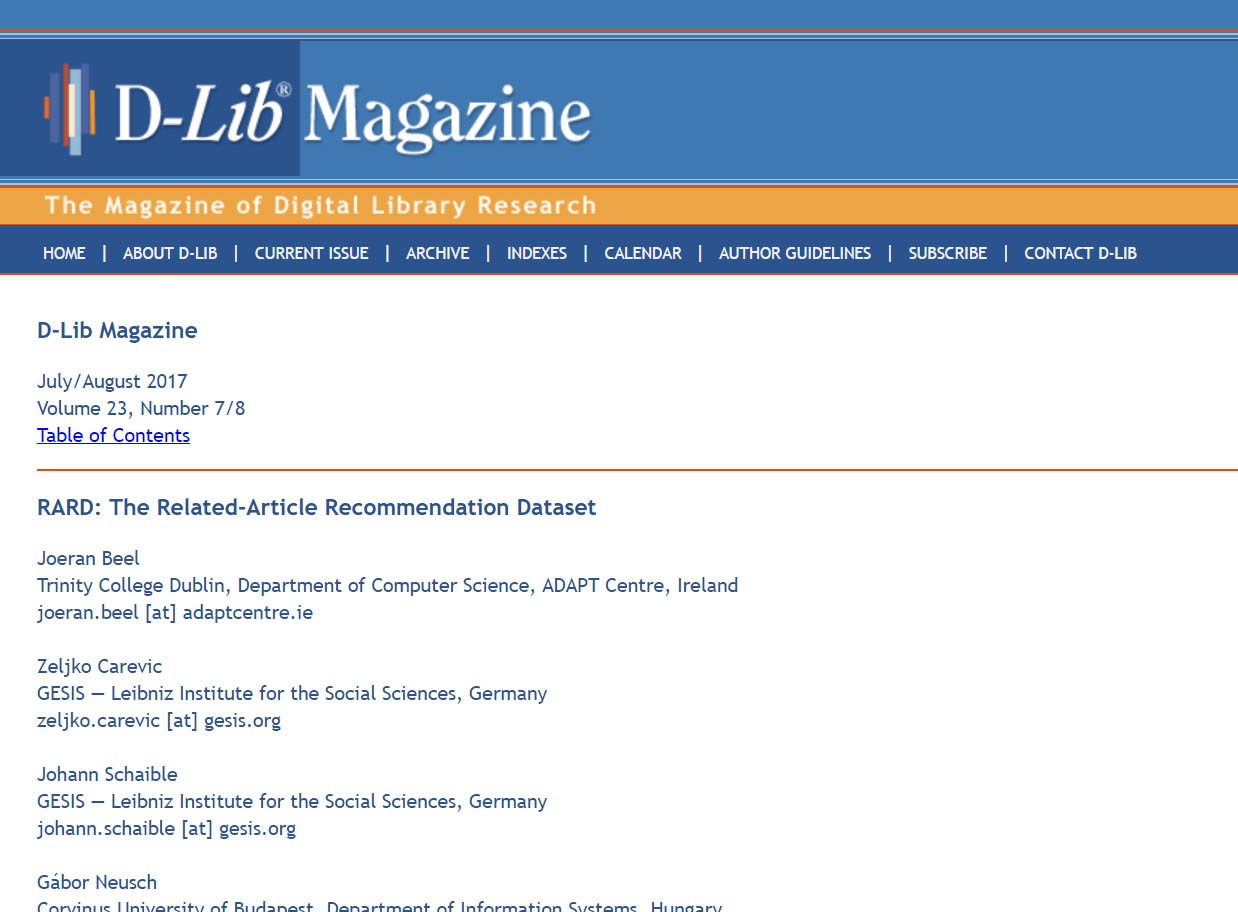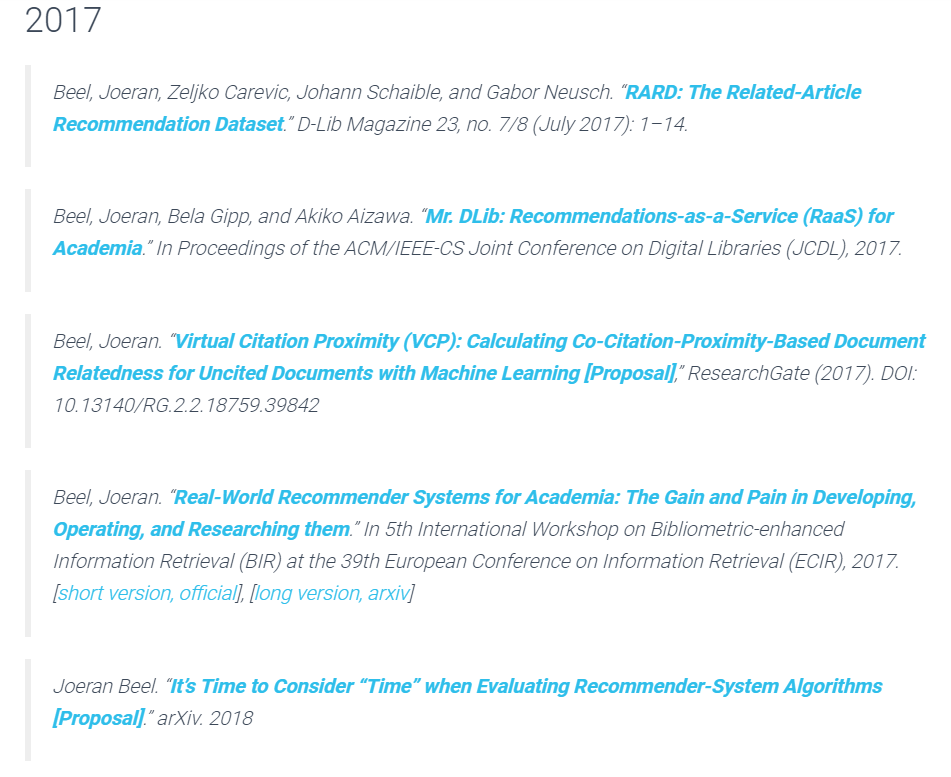Report from the 11th ACM Conference on Recommender Systems
We just returned from the 11th ACM Conference on Recommender Systems in Como, Italy. It was an amazing conference, with lots of interesting presentation relating to recommender systems. One of the hot topics at the Recommender Systems Conference was Deep Read more…
It’s Time to Consider “Time” when Evaluating Recommender-System Algorithms (Peprint)
We published a preprint on arXiv, in which we question the current practice of calculating evaluation metrics for recommender systems as single numbers (e.g. precision p=.28 or mean absolute error MAE = 1.21). We argue that single numbers express only Read more…
Machine Learning Lecture (CS7CS4) in the Upcoming Semester at TCD Dublin
In the coming term, Prof. Douglas Leith and I will be teaching an introduction to machine learning here at Trinity College Dublin, Ireland. We expect around 200 students, primarily from the new Master of Science in Intelligent System and Data Read more…
Mr. DLib v1.2.1: Improved keyphrase recommendations and Apache Lucene query handling
The new version of our recommender system completes 104 issues and significantly improves the recommendations. The most notable improvements are: We improved the keyphrase extraction process in the recommender system, i.e. keyphrases are not stored differently in Lucene. We expect better Read more…
RARD: The Related-Article Recommendation Dataset
We are proud to announce the release of ‘RARD’, the related-article recommendation dataset from the digital library Sowiport and the recommendation-as-a-service provider Mr. DLib. The dataset contains information about 57.4 million recommendations that were displayed to the users of Sowiport. Information Read more…
Mr. DLib 1.2 released: JabRef recommendations completed; CORE recommendation API connected
There are two major news coming along with the new version of Mr. DLib’s Recommendation API. JabRef finally uses Mr. DLib for it’s recommender system We have announced this already a while ago, but now, finally, Mr. DLib’s recommendations are Read more…
Interview with TechCentral.ie on Recommender Systems, Reproducibility, and GDPR
Recently, we spoke with TechCentral.ie, Ireland’s best well-known and respected technology magazine, about recommender systems, personalisation, the challenges of the GDPR and our work in the field of recommender-systems as-a-service and machine learning. The full interview is available here http://www.techcentral.ie/focus-research-joeran-beel-adapt/
New domain names for our website: recommender-systems.ie and recsys.ie
We successfully registered the domains recommender-systems.ie and recsys.ie (in addition to our already registered domain recommender-systems.de and domain relating to machine-learning). For now, all domains point to our main website https://ISG.beel.org/. In the long run, we may use these domains for more Read more…
Several new publications: Mr. DLib, Lessons Learned, Choice Overload, Bibliometrics (Mendeley Readership Statistics), Apache Lucene, CC-IDF, TF-IDuF
In the past few weeks, we published (or received acceptance notices for) a number of papers related to Mr. DLib, research-paper recommender systems, and recommendations-as-a-service. Many of them were written during our time at the NII or in collaboration with the NII. Read more…
Mr. DLib v1.1.1 released: minor improvements
On 28th February, we released version 1.1.1 of Mr. DLib’s recommender system with some minor improvements and bug fixes: Improved 404 error handling for unknown document IDs Fix: The order of authors in the XML was not sorted properly Several Read more…
Farewell party for our visiting student Stefan Feyer
Stefan Feyer from the University of Konstanz had joined the Mr. DLib team for a six months internship. Yesterday, it was time to say goodbye to Stefan and we had a small farewell party at the National Institute of Informatics Read more…
Some numbers about Mr. DLib’s Recommendations-as-a-Service (RaaS)
Six months ago, we launched Mr. DLib’s recommendations-as-a-service for Academia. Time, to look back and provide some numbers: Since September 2016, Mr. DLib´s recommender system has delivered 60,836,800 recommendations to our partner Sowiport, and Sowiport’s users have clicked 91,545 of Read more…
Mr. DLib v1.1 released: JavaScript Client, 15 million CORE documents, new URL for recommendations-as-a-service via title search
We are proud to announce version 1.1 of Mr. DLib’s Recommender-System as-a-Service. The major new features are: A JavaScript Client to request recommendations from Mr. DLib. The JavaScript offers many advantages compared to a server-side processing of our recommendations. Among others, the main Read more…
Docear’s Online Services Are Down (Recommendation; User Registration; Backup)
Currently, all of Docear’s online services are down, including the recommender system. This means, you cannot register, log-in to download backups, or receive recommendations. As we have no time right now for the development of Docear, we are afraid that Read more…
Paper accepted at ISI conference in Berlin: “Stereotype and Most-Popular Recommendations in the Digital Library Sowiport”
Our paper titled “Stereotype and Most-Popular Recommendations in the Digital Library Sowiport” is accepted for publication at the 15th International Symposium on Information Science (ISI) in Berlin. Abstract: Stereotype and most-popular recommendations are widely neglected in the research-paper recommender-system and digital-library Read more…
Machine Learning Lecture Slides Available (2017/18)
This semester my colleague and I are teaching the Machine-Learning module CS7CS4 at Trinity College Dublin. We decided to publish the lecture slides on Slideshare. The slides contain 11 lectures about machine learning, covering aspects such as an introduction to machine Read more…
Two of our papers about citation and term-weighting schemes got accepted at iConference 2017
Two of our papers about weighting citations and terms in the context of user modeling and recommender systems got accepted at the iConference 2017. Here are the abstracts, and links to the pre-print versions: Evaluating the CC-IDF citation-weighting scheme: How effectively Read more…
Demo paper about Mr. DLib’s Recommender System integration in JabRef is accepted at ECIR 2017
A demonstration paper about the integration of Mr. DLib in JabRef is accepted for publication at ECIR 2017. We will update this post soon with more information and a pre-print.
Enhanced re-ranking in our recommender system based on Mendeley’s readership statistics
Content-based filtering recommendations suffer from the problem that no human quality assessments are taken into account. This means a poorly written paper ppoor would be considered equally relevant for a given input paper pinput as high-quality paper pquality if pquality and ppoor contain the same Read more…
The popular reference manager ‘JabRef’ will be our second pilot partner for our recommender-system as-a-service
We are glad to announce that JabRef – one of the most popular open-source reference manager – will soon be using Mr. DLib´s recommender system to provide article recommendations to its users. The team of Mr. DLib and JabRef had several Skype calls, Read more…
Server status of Mr. DLib’s recommender system publicly available
Our servers for Mr. DLib’s recommender-system as-a-service (RaaS) are now monitored by UptimeRobot, a free monitoring service. You can access all our RaaS server statuses at this URL https://stats.uptimerobot.com/WLL5PUjN6 and you will see a dashboard like this: A click on one Read more…
New recommendation algorithms integrated to Mr. DLib’s recommender system
We have integrated several new recommendation algorithms into Mr. DLib. Some recommendation algorithms are only ought as baselines for our researchers, others hopefully will further increase the effectiveness of Mr. DLib. Overall, Mr. DLib now uses the following recommendation algorithms in Read more…
Two new RaaS servers are online (dev and beta system)
So far, Mr. DLib’s recommender system was running only on a single server. Consequently, when me messed up something in the development environment, sometimes the production system was affected, i.e. down. From today on, we have two additional dedicated servers running, meaning Read more…
Various positions to work on research-paper recommender systems (Mr. DLib) and Docear (Bachelor/Master/PhD/Post-Doc)
Update on 2018-03-15: We Are Hiring 1 Software Engineer & 1 Software Architect / Product Owner for a Recommender-System Business Start-up Updated on 2017-08-14: Here at Docear and Mr. DLib we have many exciting projects in the field of Read more…








